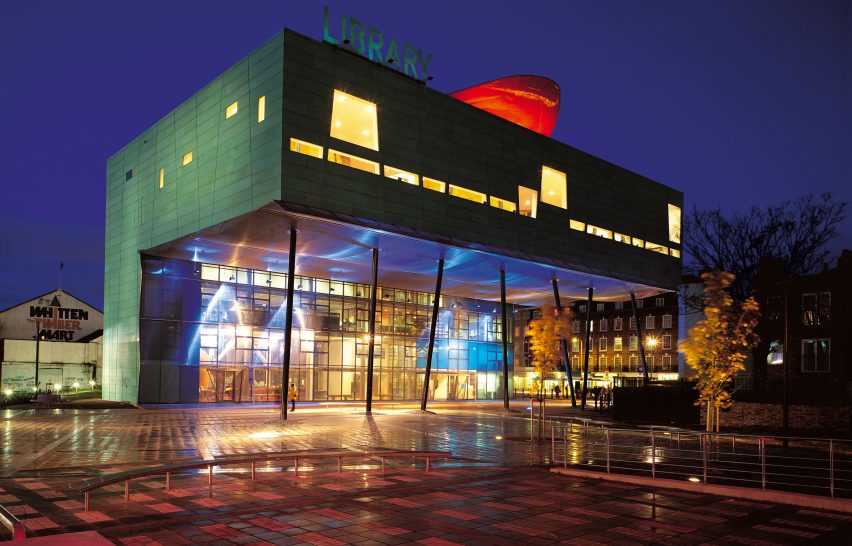British architect Will Alsop, described as "one of architecture's biggest characters and talents", has died at the age of 70 after a short illness.
Alsop, most recently the founder of architecture firm All Design, died in hospital yesterday, Saturday 12 May 2018.
The architect was known for his colourful, expressive and playful designs and his warm, generous spirit. Among his best-known buildings is Peckham Library in London, which won UK architecture's biggest accolade, the Stirling Prize, in 2000.
Architects and designers took to social media to offer condolences as word of his death spread on Sunday.
Architect Charles Holland tweeted: "I think Will's work invigorated and energised British architecture and challenged its more tedious tendencies towards piousness. His buildings were formally bold, thoroughly audacious and huge fun."
Sam Jacob, who was previously a member of architecture firm FAT along with Holland, wrote that Alsop was "really one of the most (and maybe only) generous architects of the baby-boomer generation".
London School of Architecture founder Will Hunter described Alsop as "my first boss and such a generous supporter". He said: "Loved spending time with him and his subversive spirit and energy".
Alsop "invigorated and energised" British architecture
"Will Alsop dies and so does one of architecture's biggest characters and talents, never properly appreciated in UK," tweeted architecture journalist Amanda Baillieu.
"So incredibly sad to hear of Will Alsop's passing, one of our great creative spirits," added designer Adam Nathaniel Furman. It has recently been fashionable to ridicule his work, I hope there can be pause from the easy snarking now to reflect on a career that very much enriched our architectural culture."
Pompidou runner-up while still a student
Alsop's career was as colourful as his buildings, which often featured stacked volumes or cartoonish forms raised above the ground on stilts.
He was born in Northampton in England on 12 December 1947. He studied at Canterbury School of Architecture and then at London's Architectural Association, where he came second behind Richard Rogers and Renzo Piano in the competition to design the Centre Pompidou in Paris while still a student.
He worked for architects including Maxwell Fry and Cedric Price before launching his first firm, Alsop & Lyall, with former classmate John Lyall in 1981. Jan Störmer later joined to form Alsop, Lyall and Störmer, which designed the North Greenwich tube station in London.
Peckham Library was his greatest success
Lyall then left the practice, which renamed itself Alsop & Störmer and completed Hamburg Ferry Terminal in 1993 and, the following year, the acclaimed Hôtel du Département regional government headquarters in Marseilles, France, which is better known as Le Grand Bleu on account of its blue steelwork and glazing.
The firm had its greatest success with Peckham Library, an educational and community building in southwest London that featured copper cladding, as well as Alsop trademarks including a cantilevered upper level supported by stilts and raised internal pods accessed via gantries.
Projects cancelled and closed
Alsop and Störmer went their separate ways in 2000, with Alsop forming Alsop Architects. He never managed to build on the success of Peckham Library or realise his more audacious ideas, although his 2004 extension to the Ontario College of Art & Design, which features a polka-dot box hovering on spindly legs above the existing building, is perhaps the most complete realisation of his vision.
His proposal for The Fourth Grace, a giant multicoloured swirl for Liverpool's historic waterfront, was cancelled in 2004. Financial woes followed, and in 2006 he sold Alsop Architects to SMC Group, which later became Archial.
The Public, a lottery-funded arts building in West Bromwich in England, opened in 2008 but went into administration the following year and closed in 2013 having been described by funding body the Arts Council as "not fit for purpose".
Recent projects in China
Alsop left to join international firm RMJM in 2009, the same year he completed the Chips residential building in Manchester.
Two years later he founded a new office, All Design. Based in east London, All Design had some success overseas, opening an office in Chongqing, Chin, and completing projects including the Gao Yang development in Shanghai.
In a 2015 interview with Dezeen, Alsop said that China offered more opportunities for ideas-driven architecture projects in comparison to the UK.
"In China, you can have much more wide-ranging conversations about the possibilities of a project," Alsop said. "In the UK, the idea of risk has become a much bigger factor. You come to the conclusion that it's only about money."
"Generally speaking in China – if you get the right client – they are very open and you can have a conversation about the sort of architecture you want to explore," he added. "Sadly you can't do that in the United Kingdom any more."
The British architect served as professor of architecture at Canterbury School of Architecture in Kent, part of the University for the Creative Arts. He was also a keen painter, which he saw as integral to his design process.
He was awarded an Order of the British Empire (OBE) in 1999.

